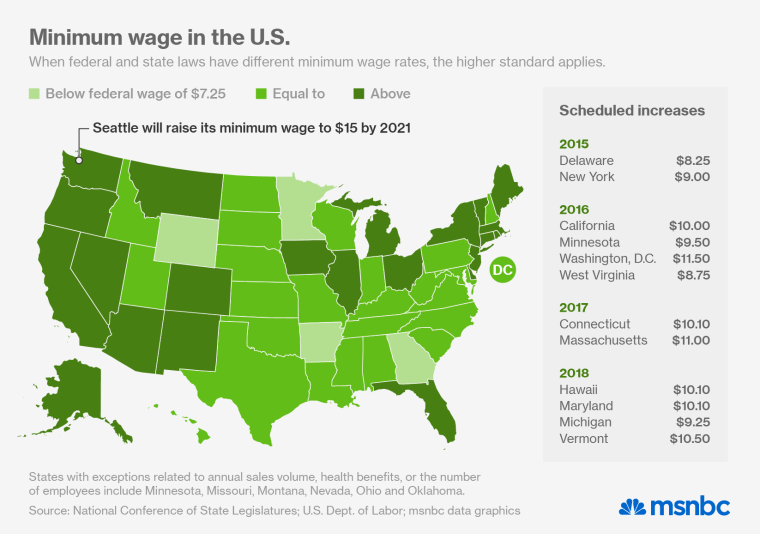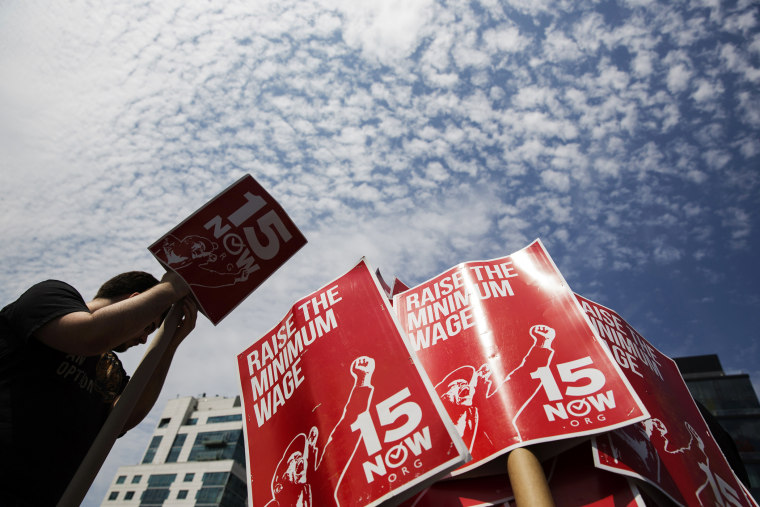Who would have guessed?
In an interview last week, the soon-to-be-named chairman of the National Retail Federation (NRF), Container Store CEO Kip Tindell, pledged to try and push the retail store trade group to change its stance against raising the minimum wage.
“I’m working, frankly, to get the NRF to maybe moderate its view on that,” he told Bloomberg. “It’s unbecoming to speak out against raising the minimum wage.”
If Tindell is successful, the reversal would be stunning. The National Retail Federation has called the proposal to raise the federal minimum wage an “anti-job tax” and has repeatedly warned lawmakers that it will include all minimum wage votes in its legislative scorecard. (For those unfamiliar with Beltway lexicon, that’s lobbyist shorthand for “cross us on this and we’ll break your kneecaps”). The NRF spent $1 million on lobbying in the first three months of 2014 alone, 50% more than the same period in 2013, coinciding with the run-up to a Senate vote on the minimum wage that Republicans filibustered. The NRF has never met a wage increase proposal it didn’t detest.
Changing course would be a bit like a Red Sox fan suddenly declaring undying loyalty to the New York Yankees, or Frosty the Snowman singing “Here Comes the Sun.”
"In many parts of the country it’s becoming harder and harder to find anyone left who actively opposes raising wages"'
Tindell joins an ever-growing list of unusual suspects who have spoken out in favor of raising wages. Conservative icons Bill O’Reilly, Rick Santorum, and Phyllis Schlafly have all expressed support for a higher minimum wage. Fortune 500 companies like Gap and Ikea have independently raised wages not only as an act of social responsibility but as a way of lowering turnover and boosting employee performance.
About six in ten small business owners – a group that trends Republican – favor raising the federal minimum wage to $10.10 and automatically adjusting it as costs rise, and the same number believe doing so will help the economy. Wealthy investors like Nick Hanauer, Ron Unz, Eli Broad, and Rick Caruso have passionately argued for minimum wages as high as $15 as a moral and economic necessity.
Actually, in many parts of the country it’s becoming harder and harder to find anyone left who actively opposes raising wages. The NRF’s powerful business group peers like the U.S. Chamber of Commerce and the National Restaurant Association have kept up the fight, but as businesses small and large peel away, you get the sense that even their hearts aren’t in it anymore.
It’s hard to blame them: this year key business leaders in Seattle not only dropped their opposition to raising that city’s minimum wage but actually threw their weight behind a plan that will lift it to an unprecedented $15. Seattle’s businesses were soon one-upped by the San Francisco business community, which agreed to let one of the country’s most liberal electorates vote on an even faster increase to $15.
Resistance is falling even in places like blood-red South Carolina, where just last month the state’s Small Business Chamber of Commerce publicly endorsed a $10.10 federal minimum wage.
"As ever, the last people to get the message can be found in Washington, where Republicans continue to fulminate against government intervention in the free market."'
As ever, the last people to get the message can be found in Washington, where in the face of reams of economic data as well as the lived experience of prior wage increases, Republicans in Congress continue to patronizingly warn against “hurting those you are trying to help” and fulminate against government intervention in the free market.
When will they get the message? When will they stop stonewalling a common sense measure that the overwhelming majority of Americans support?
If what Congressional Republicans need is political cover, they are receiving it. Big businesses are Republicans’ strongest financial backers, so groups like the NRF dropping their opposition to a higher minimum wage would have a huge impact. More entrepreneurs and main street business owners – a critical Republican constituency – speak out for higher wages daily. And four former members of Congress from their own party have now publicly called on them to revive the long tradition of bipartisanship on the issue and pass a minimum wage increase.
But Republican members of Congress – and presidential aspirants – must also answer to voters, and that may prove to be their strongest motivator. Tens of millions of Americans are struggling to get by and are increasingly fed up with Congress’ failure to help while corporations and the wealthy prosper. With the 2014 election season entering the home stretch, the crisis of low-wage work has emerged as a key point of debate in races across the country, including state legislative, gubernatorial, and Congressional races.
Midterm elections are typically low-turnout, and with Democrats needing to defend more competitive seats, pundits continue to predict Republican gains in Congress. But under the microscope of a presidential race and with the expected surge in voter interest, it is difficult to imagine any party or politician– Republican or Democrat – winning in 2016 without a clear answer to the question: “What are you doing to raise wages?”
In this environment, it may not only be unbecoming to speak out against raising the minimum wage; if Republicans fail to act, it may also be their undoing.
Arun Ivatury works with the NELP Action Fund.

